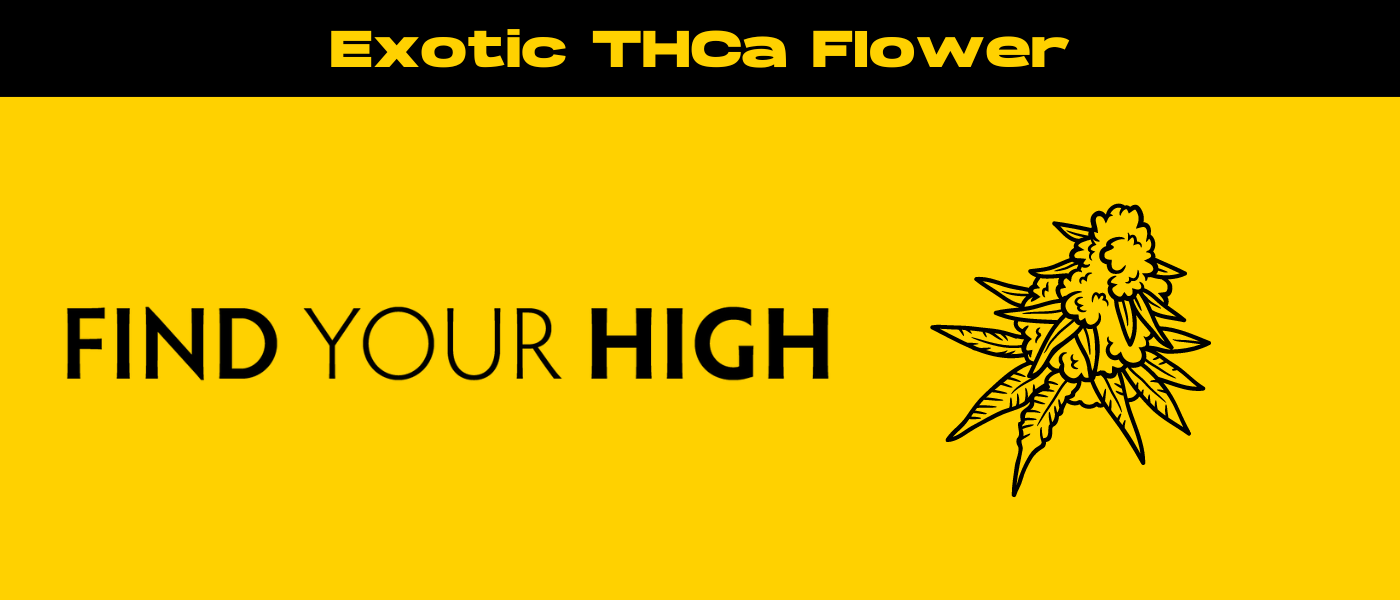Have you heard about THCa flower? It’s creating quite a buzz in the cannabis community. So, what exactly is THCa and how does it stand out from the more well-known THC?
In simple terms, THCa (tetrahydrocannabinolic acid) is the raw, non-psychoactive compound found in fresh cannabis plants. Unlike THC, it doesn’t get you high unless it’s heated up through smoking or vaping.
People are really getting into THCa flower these days—especially the exotic strains—because it offers a way to enjoy cannabis without the heady effects. Plus, it’s got some pretty cool benefits like potential anti-inflammatory and neuroprotective properties.
In this blog, we’ll dive deep into exotic THCa flower, its unique benefits, how it’s used, and tips for choosing high-quality strains. So, stick around to unravel the fascinating world of THCa flower!
The Unique Properties of THCa
Let’s start with the foundation—understanding the chemical makeup of THCa. THCa, short for tetrahydrocannabinolic acid, is a cannabinoid that starts as a precursor to THC.
The “A” in THCa indicates it’s in its acidic form. Structurally, it has an extra carboxyl group that differentiates it from THC. This carboxyl group is what makes THCa non-psychoactive, meaning you won’t get high from consuming it in this state.
When THCa is exposed to heat, the decarboxylation process kicks in. Think of decarboxylation as a fancy term for what happens when you light up a joint or bake some cannabis into brownies. The heat removes the carboxyl group from THCa, converting it into THC, the compound famous for its psychoactive effects. This transformation is why raw cannabis doesn’t get you high, but smoking or vaping it does.
Potential Health Benefits of THCa
Let’s move on to why people are excited about THCa. Although research is still in the early stages, there are some promising indications about its health and therapeutic benefits.
Anti-inflammatory Properties
One of the most exciting aspects of THCa is its potential as an anti-inflammatory agent. Some studies suggest that THCa could help reduce inflammation, making it a possible treatment for conditions like arthritis and other inflammatory diseases. For people looking for relief without the high, THCa products could be a game-changer.
Neuroprotective Qualities
Another intriguing area of research involves the neuroprotective qualities of THCa. Preliminary studies indicate that THCa may help protect the brain and nervous system from damage. This is particularly interesting for people dealing with neurodegenerative conditions such as Alzheimer’s or Parkinson’s disease. While more research is needed, the early findings are certainly promising.
These unique properties make THCa a fascinating compound worth exploring, especially if you’re looking for the benefits of cannabis without the psychoactive effects.
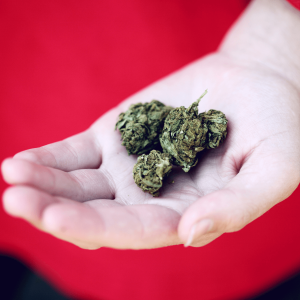
Cultivation of Exotic THCa Flower
Growing exotic THCa flower requires specific conditions to maximize the THCa content while also producing high-quality, aromatic buds. Ideal growing conditions involve a balance of light, temperature, humidity, and soil nutrients.
THCa-rich strains flourish in environments that mimic a natural, outdoor setting—think plenty of natural sunlight and a well-drained, nutrient-rich soil. Indoor growers often use high-intensity discharge (HID) lights or full-spectrum LED lights to provide the necessary light conditions.
The temperature should be kept between 70-85°F during the day and can slightly drop at night. Humidity levels should be around 40-60% to prevent mold and mildew growth, which can affect the quality of the flowers.
Organic vs. Synthetic Cultivation Methods
When it comes to cultivating premium cannabis, there’s an ongoing debate between organic and synthetic cultivation methods. Organic methods use natural soil amendments like compost, worm castings, and bone meal to provide the essential nutrients the hemp plant needs. These methods are considered more sustainable and eco-friendly. The plants grown organically often produce richer terpene profiles, contributing to the strain’s aroma and flavor.
On the other hand, synthetic methods involve using chemical fertilizers and pesticides. While these methods can yield quicker and larger harvests, they may also lead to a more homogeneous flavor profile and potential chemical residues in the final product.
Many connoisseurs prefer organically grown THCa flower for its natural taste and environmental benefits.
Popular Exotic Strains and Their Origins
- Durban Poison: Originating from South Africa, Durban Poison is renowned for its uplifting effects and sweet pine flavor.
- Panama Red: A classic strain from Panama, Panama Red is known for its smooth, energetic effects and reddish hue.
- Lamb’s Bread: A Jamaican favorite, celebrated for its euphoric and uplifting high, often associated with reggae culture.
- Acapulco Gold: Hailing from Mexico, Acapulco Gold is famous for its potency and complex mix of flavors, including earthy, sweet, and spicy notes.
- Thai Stick: Originating from Thailand, noted for its distinct fruity and citrus flavors and potent effects.
Consumption Methods
When it comes to enjoying exotic THCa flower, there are several consumption methods for cannabis enthusiasts to explore.
Smoking and vaping are the most direct ways to consume THCa, providing the classic experience of inhaling cannabis while benefiting from its aromatic and flavorful profiles.
For those who prefer not to inhale, edibles and infusions offer a great alternative; THCa flower can be incorporated into various recipes, or infused into oils and butters, to create delicious treats without the psychoactive effects.
Another innovative method involves topicals—THCa-infused balms, creams, and lotions that can be applied directly to the skin to target localized pain or inflammation.
Lastly, juicing raw THCa flower is becoming a popular way to harness the benefits of THCa flowers; this method involves blending fresh cannabis leaves and buds into a smoothie or juice to retain the raw, non-psychoactive properties and enjoy a fresh, healthful beverage.
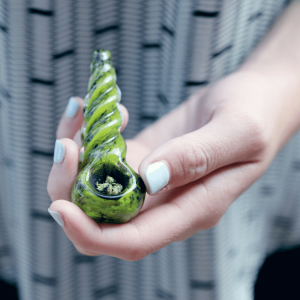
Legal Status and Regulations
The legal status of hemp flower varies significantly across different regions, reflecting a complex landscape of cannabis regulation. Unlike THC, which is well-known for its psychoactive effects and is highly regulated, THCa remains in a bit of a grey area in many places.
In regions where cannabis is fully legalized, such as certain states in the U.S., you can typically purchase THCa flower without much hassle, often from licensed dispensaries. However, in areas where cannabis laws are more restrictive, THCa flower might still be subjected to stringent regulations or outright bans, despite its non-psychoactive nature and federal legality according to the 2018 Farm Bill. This discrepancy arises because THCa can be converted into THC through decarboxylation, which raises concerns among legislators.
When buying THCa flower legally, it’s crucial to ensure you’re purchasing from reputable sources that comply with local laws. Always check the most current regulations, as cannabis laws are rapidly evolving and can vary widely from one place to another.
Potential Benefits and Uses
THCa is gaining attention for its potential to help manage a variety of conditions. Early research and anecdotal evidence suggest it might be beneficial for neuroprotection, and inflammation reduction, and could even slow the progression of certain neurodegenerative diseases.
- Pain relief: Many patients turn to THCa for its anti-inflammatory properties, which can translate to effective pain relief. From arthritis to chronic pain conditions, THCa offers a non-psychoactive option for managing discomfort.
- Anti-nausea effects: THCa has shown promise in reducing nausea and vomiting, which can be a game-changer for patients undergoing chemotherapy or dealing with other conditions that affect the digestive system.
- Recreational uses and what to expect: While THCa itself isn’t psychoactive, it can still offer a sense of relaxation and well-being when consumed. Some users appreciate the mild effects and the fact that they can enjoy the benefits of cannabis without the high.
- Patient testimonials and success stories: Hearing from real patients can be incredibly inspiring. Many have shared how THCa has positively impacted their lives, from managing pain and inflammation to improving overall quality of life. These personal stories add a human element to the potential benefits of THCa, making it more relatable and convincing.
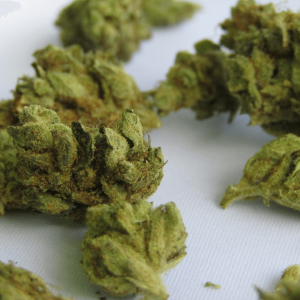
Buying and Storing Exotic THCa Flower
When it comes to purchasing and storing exotic THCa flower, ensuring quality and longevity is key. To identify premium THCa flower, look for bright, vibrant colours and a strong, distinctive aroma, which together indicate a rich terpene profile and freshness.
Trusted sources and dispensaries are crucial—opt for those with positive reviews and verified lab testing results for their products.
Once you’ve acquired your flowers, proper storage is essential to maintain their potency and freshness. Keep them in airtight containers, preferably glass jars, stored in a cool, dark place. Avoid excessive heat and moisture, which can degrade both the cannabinoids and terpenes, ensuring your exotic THCa flower remains in top condition.
Conclusion
To wrap things up, we’ve covered the essentials of exotic THCa flower, from the intriguing origins of popular strains and diverse consumption methods to the complex legal landscape and its potential health benefits.
THCa flower shows promising avenues for both wellness and recreational use, offering a natural option for pain relief, anti-nausea effects, and overall relaxation without the psychoactive high of THC.
As the cannabis industry evolves, THCa could become a more prominent player, providing new opportunities for users to explore and enjoy. We encourage you to try THCa flower for yourself and share your experiences, helping to build a broader understanding of its unique benefits. With the convenience of cannabis delivery services, accessing THCa flower has never been easier.
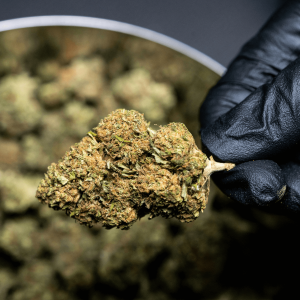
Frequently Asked Questions
1. What is THCa and how does it differ from THC?
THCa, or Tetrahydrocannabinolic Acid, is a non-psychoactive cannabinoid found in raw cannabis plants. Unlike THC, which is known for its mind-altering effects, THCa doesn’t cause a high. However, when heated through smoking, vaping, or cooking, THCa converts into THC, leading to psychoactive effects.
2. Can I consume THCa flower without getting high?
Yes, you can consume THCa flower without getting high, as long as it remains in its raw form. Methods like juicing raw cannabis or using THCa-infused topicals will not produce psychoactive effects. However, if THCa is heated, it converts to THC and will cause a high.
3. Where can I legally purchase THCa flower?
The legality of purchasing THCa flower depends on your location. In regions where cannabis is fully legalized, such as certain states in the U.S., you can find THCa flower at licensed dispensaries. It’s important to check your local laws and buy from reputable sources that comply with regulations to ensure the product’s legality.
4. How should I store my THCa flower to maintain its quality?
To keep your THCa flower fresh and potent, store it in airtight containers, preferably glass jars, and place them in a cool, dark area away from excessive heat and moisture. Proper storage helps preserve the cannabinoids and terpenes, ensuring your THCa flower stays effective and aromatic.

 Rewards
Rewards



